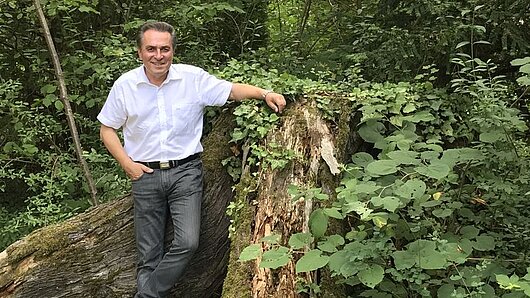High-Performance Computing Center Stuttgart

As Academy Director Claus-Peter Hutter explains, the collaboration with HLRS has exceeded expectations, revealing additional opportunities for partnerships between HLRS and local companies and municipalities.
Because the Academy is an office of the State of Baden-Württemberg's environmental ministry, an important part of our mission is to help anchor the theme of sustainability in society. Because no single person, company, or municipality can make sustainability a reality alone, we network extensively and try to bring together partners who can together help to promote our sustainability goals.
In 2009 partners from the business world brought HLRS to our attention and over the course of conversations with HLRS Director Michael Resch we quickly realized that we shared certain approaches that would make it possible to promote themes like sustainability and environmental responsibility in a high-performance computing center and among others in its network.
At the beginning we developed a kind of itinerary that would enable HLRS to begin engaging with the theme of sustainabilty, and held various workshops to define what sustainability could mean for the center and its daily operation. Building on this, and with our support, HLRS developed a sustainability strategy and is now working hard to live and develop this strategy further. In 2018 the center will also apply for EMAS certification—EMAS (Eco-Management and Audit Scheme) is the most demanding program for sustainability for organizations in the EU. HLRS will also introduce an energy management system meeting ISO 50001 requirements in 2019.
During this process it was also very interesting to learn about additional opportunities that HLRS offers for improving sustainability in Baden-Württemberg.
As an environmental provider, HLRS offers incredible opportunities for city planning and in the development of infrastructure projects for commercial planning. Together with HLRS, for example, we have organized symposia with the Verband Region Stuttgart—an organization that is responsible for regional planning of towns and open space in the greater Stuttgart area. The symposia showed very quickly that HLRS, using simulation and visualization, can help make planning processes, including the challenges and opportunities that they bring, easier to understand.
Simulation is also extremely relevant for studying aspects of climate in cities and in climate protection. Since then the Academy has referred several town councils to HLRS; many were not previously aware of the capabilities that HLRS offers for making the most of data they had gathered.
Simulation is also important for sustainability in industry in Baden-Württemberg. It's an unavoidable fact that high performance computing requires high energy usage, but when one thinks about the importance of wind resistance and technologies for optimizing fluid dynamics in automobile design, one quickly recognizes how simulation helps to save enormous amounts of energy. Today these kinds of approaches can be found everywhere in the engineering sciences.
People often accuse scientists of forgetting to point out how humanity, including the taxpayer, benefits from basic research. HLRS is, of course, a scientific institute but because of the research it supports from industry and society, it also has a great deal of practical experience. This offers the opportunity to facilitate the diffusion of work taking place at the University of Stuttgart into society.
From my perspective, the collaboration between the Academy and HLRS has been a very successful project that has far exceeded our initial goals, and will continue to do so. Working together with HLRS, we have been able to expand our existing network and even create new networks from which all participants are now benefiting. At a basic level, what's happening here is no different than what occurs in nature. Ecological systems are fundamentally networks in which all of the parts depend on one another. The more open we are to working with others—and not just working in isolation—the better we can work for the benefit of the environment and society.
— Interview by Christopher Williams